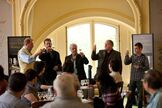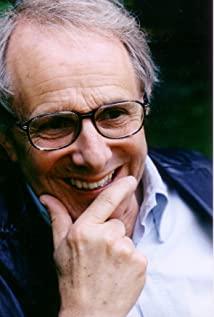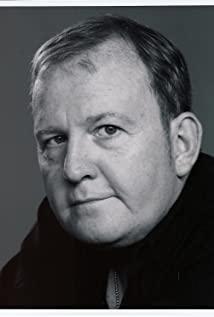"An Angel" (2012) is a film directed by British director Ken Loach, famous for its realistic description of the road to self-salvation of young workers on the verge of unemployment. The title "Angels' Share" (Angels' Share) is a term for the part of the whisky that is lost due to evaporation during the process of aging in oak barrels (from the female commentator, "about 2% of the wine is lost every year, and it just disappears and evaporates. Into the air and disappear forever, this is called'angel's share'"). At the end of the story, it is smoothly transformed into an expression of Ken Rocky's moral philosophy: for the changes that Robbie is trying to make, the process of refining and alcohol evaporation is used as a metaphor, just like them The goodness of human nature is depleted; however, since it is an "angel" behavior (of course, considering the teasing of Catholic priests in "Stone Rain" and "Jimmy's Ballroom," Rocky clearly uses the term in the atheistic sense The symbolic meaning of ), this depletion is also a necessary part of the perfection or "sublimation" of the humanity of the working class. In the 30th minute of the film, the protagonist Robbie and his friends visited a winery. For the first time, they were exposed to the process of wort to wine. The female commentator showed the interior space of the winery, including the distillation room. We noticed the wine for the first time. It is a theme of this movie-from the worker alcoholics, the winemaking craftsmanship to the comedy auction of famous wines and the "stealing of wine". The production of wine is a precise process. It is necessary to consider the fineness, volume, shape, origin, etc. of the barrel, just like the person himself, but also because of the different "genetic" environment, the original instinct for good is in different spatial fields. Different expressions. Rocky’s wonderful tone makes the “illegal” act of stealing comedicized and made lighter. This film review will also focus on analyzing how Rocky uses "stealing" to demonstrate a worker's life ethics based on local conditions and "specific analysis of specific issues", so as to share the "light" in his heart with the bottom of society under his lens.
This moral fable about "distillation" and "sublimation" involves the more direct "humor" or "relaxation" in Ken Rocky's works, and the reconciliation of the working class with life and fate in its own position. The protagonist Robbie is a Glasgow boy in a family trouble. After he escaped from prison, he faced the birth of his son and his father-in-law, wife and other people's identification and denial of his ability to be a "father". He realized his responsibility and desperately wanted to find There is a way out, but I find myself struggling, especially the harassment of street gangsters who have been fighting with before. While serving in the community, he met Rhino, Albert and Mo, and formed a close partnership with them (in terms of emphasizing the organic relationship between the workers’ community, this continued Rocky’s consistent Ideas). What Robbie didn't expect was that an occasional "wine tasting" might change their lives. His olfactory sensitivity was initially just a mixture of foul language and mocking jokes among friends chatting, and was not taken seriously, as the following line implies: "Now we can smell a hundred in the air based on our primitive instincts. One-tenth of the alcohol smell returned to our ancestors' sense of smell when they crawled on the ground (some people never evolved, did they?)" By chance, he was confirmed by a well-known whiskey collector as a distinguished high-quality whiskey "Talent", but he still disagrees, and he doesn't know what he can do with this "talent". Until later, under the pressure of changing his life and "being good", he led his friends to the winery in the Scottish Highlands and played the biggest gamble of his life...
In the second half of the story, the trend of the plot is getting closer and closer to the fusion of crime films, melodramas and comedies. This is significantly different from Rocky's early realism documentary. Rocky’s early films belonged to the tradition of “kitchen sink dramas” (late 1950s-1960s). He learned avant-garde shooting methods such as pivot jumping from the French New Wave, and amateur actors and actresses from Italian realism. Natural light and other technologies, for the first time, focused the vision of British films on controversial social issues such as the division of working families, the education of working-class youth, unemployment, alcoholism, and women’s abortion, and their sharp and prolific works produced a strong society. The effect, in a sense, makes the film a weapon in the political struggle for the welfare of workers. Like "An Angel", several of his working-class movies are set in the sluggish industrial city of Glasgow, with relatively repetitive themes. For example, "My Name Is Joe" and "Sweet Sixteen" all tell the working class's vicious circle in its weaknesses in alcoholism, drug abuse, domestic violence, and street fighting, and the difficulty of "re-behaviour". This not only belongs to the British "kitchen sink drama", but also has a naturalistic characteristic of Zola. Through the creative use of handheld cameras, untrained actors, and their own accents (which often require subtitles for English audiences), Rocky accurately captures the crude language of the working class and their unique faces, achieving a kind of reality Fascinating engraving. This high sense of reality makes us have a willing sympathy for the central character and creates a very real tension when watching the movie. For example, in the billiards room, Robbie accidentally encountered an attack from his former opponent again. With the help of a friend, he escaped outside. The troublemaker kept chasing into the street. There was a classic Ken Rocky chasing scene, accompanied by tense music. The camera looked for, tracked, chased, and recorded Robbie's panic like a murderer until he was rescued by Matt (Robby's father-in-law) who was driving over. Matt said: "It's too late, even if you want to change, they won't let you change." At this time, the music that accompanies the camera is stopped accurately, bringing a corresponding sense of "escape" to the audience. .
In closer examination, this sympathy and identification comes from the melodramatic and comedy elements contained in the heaviness of his social realism style. For example, there is a scene in which Robbie once again finds the tracking vehicle of his old opponent after going out with his wife. He asks his wife to go first, and then threatens the other party with a dagger not to interfere with his life again. After getting a positive promise and letting go, he leaves. Robbie kicked the motorcycle on the side of the road (who mistakenly thought it was a stalker), only to find that it belonged to a stranger. Or some dialogues in the film that only happen to "illiterate" people:
"It's almost like moving the Mona Lisa to your house."
"Mona who?"
...
"Who is Einstein?"
"Einstein is Mona Lisa's friend, do you remember Mona?" (63 minutes)
Or a joke about wearing a kilt during the trip, or "Even if we get wine, who would buy it from our scumbags?" This "sober" from the bottom of society.
Generally speaking, the humor and comedy in Rocky’s movies are not only the result of a shooting style and narrative method, but also comes from Rocky’s own Marxist beliefs and true recognition of the position of workers. This is in the late 20th century. The light that faded after the big failure, in Rocky's movies, became brighter as he grew older, making him stand out among many directors who pay attention to critical subjects.
As the scholar Dai Jinhua said: “The multiple practices simultaneously with Ken Rocky can all be related to realism, but none of them is the original realism, such as the Dany Brothers and Abbas Kiarostami. , And the realism of the three Mexican heroes that underpin American movies today... We can easily see that "Rosetta" and "Close-up" are not Ken Lodge. Of course, "Wild Hunter"-our next issue-certainly It’s not Ken Rocky either. Although in practice related to realism, we can see certain shared factors among these people, such as questioning the truth under the historical surface, such as compassion for marginalized people, such as The deep concern for the hidden history, in this respect, "Close-up" and "Wilder Hunter" are the same... But the exception of Ken Rocky is that he still boldly and fearlessly displayed the inner light in the 20th century, very accurate, Pass his value pursuit in a modest manner.” For example, one of the characteristics of Rocky’s film is that it highlights the unity and sense of humor of a group of workers, whether it’s in "The Voyager", "Sweet Sixteen", or In works such as Rick, Bread and Roses, and Jimmy’s Ballroom, the organic connection between the main characters and their communities has led to a dramatic climax marked by parades, collective struggles, strikes, and farewells. It is also shared by "An Angel".
Similarly, although the behavior of the protagonists in Ken Rocky's films is often "illegal", they seem to have a kind heart, are very compassionate, have affection for family, and obsession with friends. In "Sweet Sixteen", Liam wants to take his mother away from the past life and provide a new start, but finds that the only way to rebuild a new life is to become a drug dealer. In "An Angel's One", in order to prove that he is a qualified "father", Robbie must take the risk once again-by stealing to achieve his goal. This can even be said to be a "conventional" in Rocky's works: stealing is a public behavior of many of Rocky's movies. In "Rainstone", unemployed workers stole turf from the bowling alley of a Conservative Party club; in "My Name is Joe", a group of unemployed youth steal football shirts and shorts from a van; in "Bread and Rose" In ", Maya robbed a gas station; in each case, these deviant behaviors were for more moral motives. Lodge apparently agrees 19 "Property is theft" of the French anarchist Proudhon of the century. Of course, another direct influence from the film may be Vittorio de Sica's "The Biker" (1948). What needs attention is how Rocky concentrated the "light" on Robbie's "typical image" by accurately assigning morals between different characters in the film: before stealing the idea of "an angel", Mo (Mo) Stole a few bottles of wine in the tasting room they visited and was found by Robbie before getting into the car. When he tried to stop the other party's behavior, he reminded that his colleagues might lose their jobs. Similarly, it was Mo (Mo) who made the suggestion to make a profit from the information provided by the whiskey collector, and it was initially rejected by Robbie. During the execution of the plan, Robbie used the fables he heard in prison about smuggling donkeys, organized a decent team to hang around in front of the boss, requesting photos, and a series of similar decision-making processes, highlighting Robbie Different from the organization ability and wisdom of "pig teammates". In the wine room, Robbie's conversations between collectors and Angus also involved theft or exchange, which made Robbie's "theft" relativized, at least it is no longer a "working-class vice." The wine tasting process surrounded by many media at the auction turned into a bourgeois self-deception, the true and the false are indistinguishable, and the spectacle is full of ugliness. When Robbie reappears, it is at the auction floor, where he disappeared last time. As someone who knows the "truth", watching the already blended wine was sold at a high price of 1.15 million. The conversation with the collector also showed that he had no intention of deceiving: "(How much of this wine do you have?) Collect one bottle, exchange one bottle, drink one bottle with friends." Robbie verified the wine by proving his illegal origin. Purity. Conversely, the price of his "honest seller" status is to reveal the primitive nature of "capital accumulation" as the first pot of gold in his life. At the end, in order to imply that Robbie was not a greedy shameless person, but only took the specific "share" he needed, the film also asked Robbie to gift one of the bottles to his "friend".
At the beginning of the film, through court judgments, the family environment of alcoholism, unemployment, and the possible impact of the community's punishment of a person who has committed minor faults on the individual have been explained clearly. As the character in the film said: "Your father is a bastard, your brother is a bastard, and you are also a bastard. When you stop here, you are not allowed to touch your child and his mother Leonie." Or Luo Bi explained to Leonie: "His dad fought with my dad when he was in school, and I fought with him when I was in school. My son will fight with his son in the future, just for vanity and fear of embarrassment in front of him." But Rocky has developed an understanding of this kind of alcoholism and violence "inherited" by the family and the community, which is contrary to the naturalistic "genetic determinism". He observed the driving force of self-purification in the process of protagonist Robbie's "growing up". Through flashbacks, we see that his violent behavior on the street caused an innocent person's eyeballs to fall off, but through Robbie's silent confession when he saw the injured again, the film also captured his introspection: through the "angel" of his son. Responsibility, he is aware of the impact that one person may have on another person’s life.
Through these examples, we can find that Rocky is a typical left-wing filmmaker, but this does not limit his work. There is no predetermined theoretical framework or ethical code for his work. The behavior of the character is determined by the response to the environment, not by the learned morality. The people in "Sweet Sixteen" are not positioned on the scale of good and evil that does not exist in the movie concept, but constantly changing in the environment, opportunity (or lack) and their relationship. Lodge shows how desperate individuals can resolve broader social problems such as unemployment and community erosion while resorting to illegal methods of making money, such as petty crime and drug dealing. It is undeniable that he is very interested in showing a recognized worldview that conforms to the principles of class struggle (like in "The Wind Blowing Wheat Wave" and "Jimmy's Ballroom"), but his works are mainly humanitarian and even humanistic. Philosophical; he shows us a series of personal stories, rather than constructing a unified political allegory.
Therefore, although the movie "A Piece of Angels" presents an uncompromising and grim reality, it also has some short-lived humor and tenderness. The characteristic of Rocky is to treat his protagonist sympathetically and to put 20th-century social realism The rare light in the medium gives them, and we did not see this in the "kitchen sink realism" of the 1950s and 1960s. In "A Piece of Angel", Robbie's method may be illegal and immoral, but his motives are decent and humane, and Leah who wants his mother to live a better life in "Sweet Sixteen" Like Mu, his love for newborns and wives is obvious, which makes his behavior with certain moral flaws redefined as "angel" behavior-a necessary means to lead life to a higher level.
Compared with early Rocky works close to documentary such as "Casey Going Home", "A Piece of Angel" is more melodramatic and almost no longer has the nature of a documentary. Although amateur actors, deliberately rough camera movements are still retained, giving his films a direct sense of life. But the plot is stronger, with a lot of soundtracks used in the tense parts (although it's just right and adequate), and it has a nearly mechanical ending. After experiencing a "missing"-the police found fault and two bottles were broken by the "pig teammate", Robbie, like Oliver of Dickens, finally got a "large sum of money" and a job, and gradually Take a different path from neighbors who have corrupted themselves. Audiences who are familiar with "kitchen sink drama" or Zola-style naturalism will certainly understand how remarkable the changes Rocky has brought to the story. The emphasis on the kindness of workers’ “humanity”, the “struggle” for opportunities for them to reform and revitalize, and even the “satisfaction” of the ending. These imaginative solutions to sharp and realistic problems have made the workers in Rocky’s works feel good. More "light". Of course, Rocky’s stability rather than breakage lies in the fact that, just as his early film "Casey Going Home" was criticized for adding too much "fiction" to documentaries, his recent films may be considered Too much emphasis on the "documentary" content in the melodrama. In fact, he is only loyal to himself, seeking an ideal balance between reality and fiction, documentary and melodrama.
In short, compared with many of his other early works, "A Piece of Angel" is not so severe, and there are many comedies (and some crime scenes) to alleviate the dullness of realism. The underlying humor, even in extreme desperation, is not only a dramatic technique, but also a product of Rocky's firmer working-class recognition, which distinguishes him from the realist directors of his time.
View more about The Angels' Share reviews











